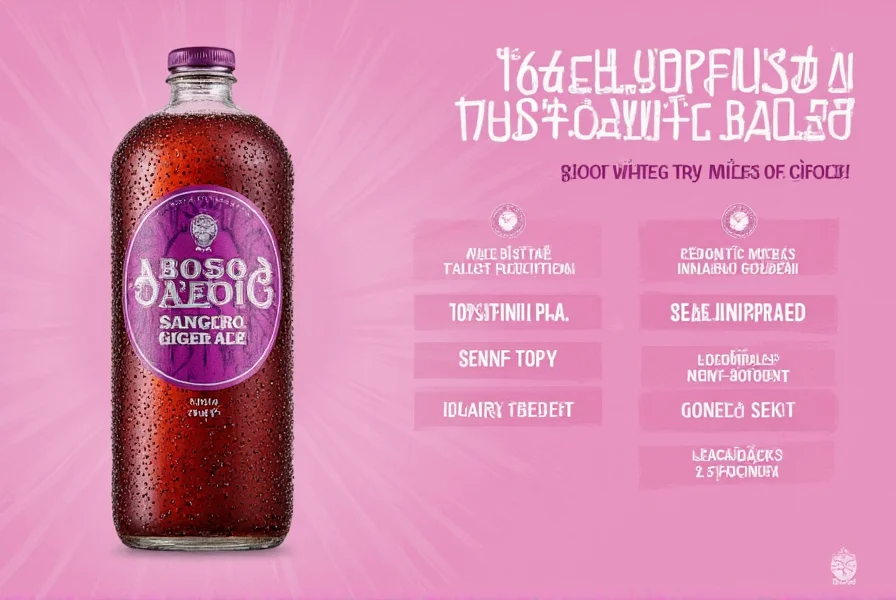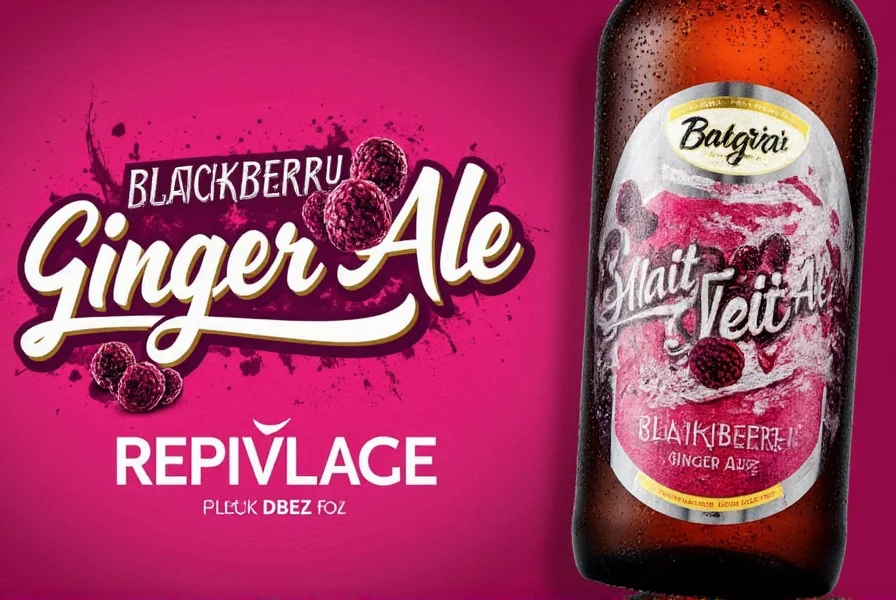Blackberry ginger ale has emerged as a popular craft soda option, blending the classic appeal of ginger-based beverages with the rich, fruity notes of blackberries. This unique fusion creates a sophisticated alternative to standard ginger ale, appealing to both cocktail enthusiasts and non-alcoholic beverage drinkers seeking complex flavors. The beverage typically contains carbonated water, ginger root extract, blackberry juice concentrate or natural flavoring, cane sugar or other sweeteners, and citric acid for balance.
What sets premium blackberry ginger ale apart is the quality of ingredients used. Artisanal producers often employ real blackberry puree and freshly grated ginger rather than artificial flavors, resulting in a more nuanced taste experience. The ginger provides a subtle warmth that complements rather than overwhelms the blackberry flavor, creating a harmonious balance between sweet, tart, and spicy elements. This careful formulation makes it particularly versatile for both standalone enjoyment and as a mixer in craft cocktails.
The Evolution of Blackberry Ginger Ale
Ginger ale itself has roots in 19th century Ireland and Canada, where it was originally created as a medicinal tonic. The blackberry variation represents a modern craft soda movement innovation, gaining popularity in the 2010s as consumers sought more complex, adult-oriented soft drinks. Small-batch soda makers began experimenting with fruit infusions to traditional ginger recipes, with blackberry proving particularly successful due to its complementary flavor profile.
Unlike ginger beer, which undergoes fermentation and has a stronger, more assertive ginger flavor, blackberry ginger ale maintains the lighter carbonation and milder ginger presence of traditional ginger ale while adding fruit complexity. This distinction makes it more approachable for those who find ginger beer too intense, while still offering sufficient character for discerning palates.
Commercial Blackberry Ginger Ale Options
Several craft soda companies now produce quality blackberry ginger ale. The market has expanded beyond niche producers to include some mainstream beverage companies recognizing growing consumer interest in flavored craft sodas.
| Brand | Key Features | Alcohol Content | Where to Find |
|---|---|---|---|
| Fever-Tree Blackberry & Ginger Ale | Natural blackberry juice, premium ginger extract | 0% | Major grocery chains, liquor stores |
| Q Mixers Blackberry Ginger Ale | Cane sugar sweetened, no artificial flavors | 0% | Specialty food stores, online retailers |
| Reed's Blackberry Ginger Brew | Real blackberries, 12g fresh ginger per bottle | 0% | Natural food stores, supermarkets |
| Bundaberg Blackberry Ginger Beer | Australian craft formula, brewed not carbonated | 0.5% (naturally occurring) | International grocery sections, specialty stores |
Flavor Profile Analysis
Blackberry ginger ale offers a multi-dimensional taste experience that evolves on the palate. The initial impression is typically sweet blackberry fruitiness, followed by the distinctive warmth of ginger that builds gradually without becoming overpowering. High-quality versions maintain a delicate balance where neither flavor dominates, creating a refreshing beverage with sophisticated depth.
The carbonation level significantly impacts the drinking experience. Premium blackberry ginger ales often feature medium carbonation that enhances the flavor release without creating excessive fizz that can mask subtler notes. The finish should be clean with a pleasant lingering warmth from the ginger and a subtle fruit aftertaste.
Culinary Applications
Blackberry ginger ale's versatility extends far beyond being enjoyed on its own. Its complex flavor profile makes it an excellent mixer for both alcoholic and non-alcoholic beverages. Bartenders particularly value it for creating sophisticated craft cocktails that balance sweet, tart, and spicy elements.
For cocktail enthusiasts, blackberry ginger ale serves as an exceptional base for modern takes on classics. It pairs particularly well with bourbon, vodka, and gin, creating balanced drinks that don't require additional sweeteners. The Blackberry Ginger Smash—combining two ounces of bourbon with four ounces of blackberry ginger ale over ice—has become a popular menu item at craft cocktail bars.

Non-alcoholic applications include using it as a base for sophisticated mocktails, incorporating it into fruit punches, or even using it as a flavorful addition to sparkling water for a healthier alternative to traditional sodas. Some creative chefs also use it as a braising liquid for poultry or as a component in fruit sauces.
Homemade Blackberry Ginger Ale Preparation
Creating blackberry ginger ale at home allows for complete control over ingredients and flavor intensity. The basic process involves making a ginger simple syrup, adding blackberry puree or juice, and carbonating the mixture.
A quality homemade version requires fresh ginger root, ripe blackberries, sugar, water, and a carbonation system. The ginger should be peeled and finely grated to maximize flavor extraction. Simmering the grated ginger with equal parts water and sugar creates a robust ginger syrup that forms the foundation. Fresh blackberries are then simmered separately to create a puree, which is strained to remove seeds before combining with the ginger syrup.
The mixture is cooled completely before carbonation to prevent excessive foaming. Home carbonation systems like SodaStream can be used, though traditional bottle conditioning with yeast (as used in ginger beer production) creates a more complex flavor profile with natural carbonation. Homemade versions typically keep for 1-2 weeks when refrigerated.
Health Considerations
While blackberry ginger ale is generally considered a treat rather than a health beverage, it does offer some potential benefits compared to standard sodas. The ginger content provides natural compounds like gingerols that may support digestion and reduce nausea. Blackberries contribute antioxidants including anthocyanins, which give the beverage its distinctive color.
However, most commercial varieties contain significant sugar content—typically 20-30 grams per 12-ounce serving—so moderation is advised. Some craft producers offer reduced-sugar or sugar-free options using natural sweeteners like stevia or monk fruit, providing a lower-calorie alternative without sacrificing flavor complexity.
Where to Find Quality Blackberry Ginger Ale
Availability of blackberry ginger ale has expanded significantly in recent years. While initially limited to specialty beverage shops and high-end grocery stores, it's now commonly found in the craft soda sections of major supermarkets. Liquor stores often carry it as well, recognizing its popularity as a premium mixer.
For the widest selection, online retailers specializing in craft beverages offer numerous options that may not be available locally. Many craft soda producers also sell directly through their websites, often providing seasonal varieties or limited editions not found in retail stores. When selecting a product, check the ingredient list for natural components and avoid versions with artificial colors, flavors, or high-fructose corn syrup for the best quality experience.
Conclusion
Blackberry ginger ale represents an exciting evolution in flavored carbonated beverages, offering a sophisticated flavor profile that appeals to both traditional ginger ale fans and those seeking more complex soft drink options. Its versatility as both a standalone beverage and cocktail mixer has cemented its place in the craft beverage movement. Whether enjoyed straight from the bottle, used as a cocktail mixer, or incorporated into culinary creations, quality blackberry ginger ale delivers a distinctive taste experience that balances fruit sweetness with ginger's characteristic warmth.
Frequently Asked Questions
Is blackberry ginger ale alcoholic?
Most commercially available blackberry ginger ale products contain 0% alcohol and are classified as non-alcoholic beverages. Some craft varieties, particularly those using traditional brewing methods like Bundaberg, may contain up to 0.5% naturally occurring alcohol from fermentation, but this is well below the threshold for classification as an alcoholic beverage.
How does blackberry ginger ale differ from regular ginger ale?
Blackberry ginger ale differs from regular ginger ale primarily through the addition of blackberry flavoring and natural coloring. While traditional ginger ale focuses solely on ginger flavor with a clear or pale golden color, blackberry ginger ale features a distinctive purple hue and a more complex flavor profile that balances sweet-tart blackberry notes with ginger's characteristic warmth. The blackberry version typically has a fruit-forward profile where the ginger plays a supporting rather than dominant role.
Can I make blackberry ginger ale at home?
Yes, you can make blackberry ginger ale at home using fresh ginger, blackberries, sugar, water, and a carbonation system. The process involves creating a ginger syrup by simmering grated ginger with sugar and water, preparing a blackberry puree, combining the elements, and carbonating the mixture. Homemade versions allow for complete control over sweetness and ginger intensity, though they require more effort than purchasing commercial products.
What cocktails work well with blackberry ginger ale?
Blackberry ginger ale pairs exceptionally well with bourbon, vodka, and gin in cocktails. Popular combinations include the Blackberry Ginger Smash (bourbon and blackberry ginger ale), the Blackberry Gin Fizz (gin, blackberry ginger ale, and fresh lime), and the Blackberry Mule (vodka, blackberry ginger ale, and lime juice). Its complex flavor profile means it often eliminates the need for additional sweeteners in cocktail recipes.











 浙公网安备
33010002000092号
浙公网安备
33010002000092号 浙B2-20120091-4
浙B2-20120091-4